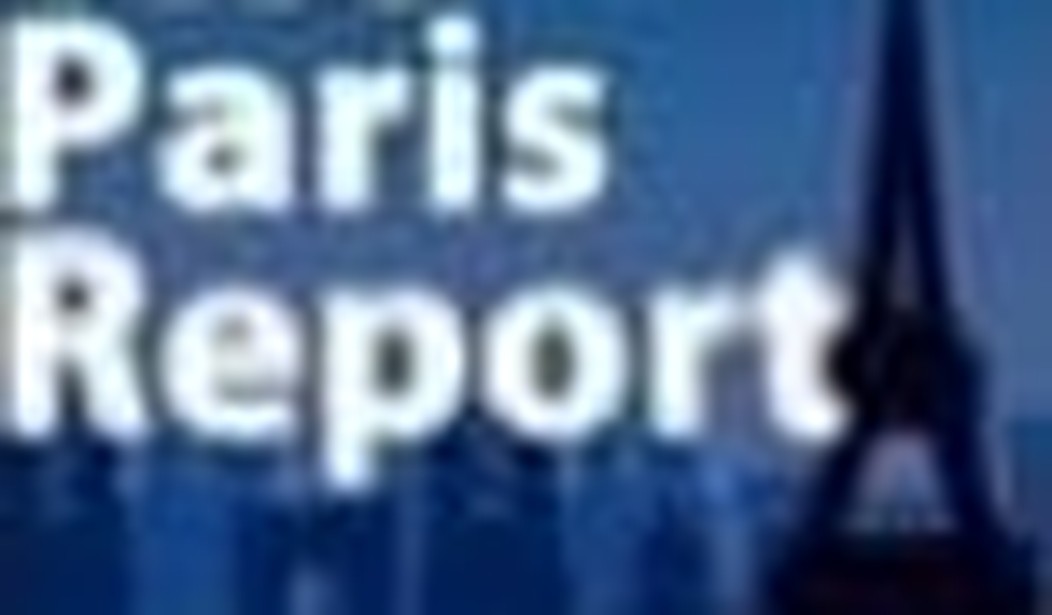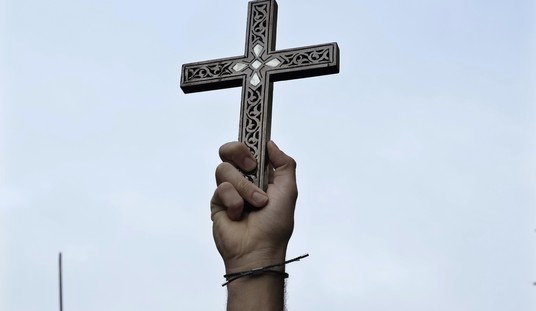François Hollande, the French socialist contender, shaking hands with incumbent conservative president Nicolas Sarkozy: it happened last Wednesday in Paris in front of about a thousand eyewitnesses and national TV cameras.
Quite an event, in the highly volatile context of the French presidential campaign. The first ballot is scheduled to take place in ten weeks on April 22, and the second two weeks later on May 6. According to the latest BVA poll, Hollande is currently the frontrunner, with 30% on the first ballot against 26% for Sarkozy. Marine Le Pen, leader of the National Front, is a solid third at 17.5%. Two more candidates are worth mention: François Bayrou, a centrist outsider, has 13%; and far left Jean-Luc Mélenchon has 8%.
Sarkozy and Hollande met at Pavillon d’Armenonville — a posh restaurant in the middle of Bois de Boulogne — for the annual dinner of CRIF, the Representative Council of French Jewish Organizations. Sarkozy was the honored guest, as he has been three times since his election in 2007. Hollande, who was duly invited as another mainstream political VIP, agreed to attend as well — a move that was not entirely anticipated.
Everybody remembered the 2007 CRIF dinner, held a few weeks ahead of the election. Both Sarkozy — then the minister of Interior and the conservative candidate — and socialist candidate Ségolène Royal appeared at the cocktail hour preceding the dinner, but Mrs. Royal was adamant about not being seen anywhere near Sarkozy. Hollande deliberately reversed that approach: he sat throughout the dinner at the secondary table he had been assigned to and listened carefully, with a measure of respect, to the president’s speech. Hollande stayed until dessert in the custody and companionship of Meyer Habib, CRIF’s vice president and a close friend of Israel’s Prime Minister Benjamin Netanyahu. The only time Hollande rose from his seat was to greet Sarkozy.
Why did Hollande behave as such? A first answer has to do with the complexities of French gender relations: he happens to be Royal’s ex-common law husband. They lived together from 1970 to 2006 and have four children. He may have felt a need to contradict her behavior.
But there is a second answer: as a political leader, Hollande plays on inclusiveness, not on polarization, and it has worked so far: he won the socialist primaries last fall and has enjoyed sound popularity rates ever since then.
A few days before CRIF’s dinner, he delivered his first real public speech as a socialist candidate in Le Bourget, a suburb of Paris. The only enemy he mentioned was “Big Money”: something that in France sounds like cannibalism does in the United States; is attacked by Left and Right alike; and means nothing in practical terms. He didn’t claim to be the champion of the French socialists, nor of the French Left. And he never uttered Sarkozy’s name.
Perhaps, there exists even another motivation. The French are not entirely politically stupid: they know there is a world crisis, and they understand that neither the Right alone (as it is now) nor the Left can deal with it. They wish there was some kind of national unity, if only for a while, in order to address many of their many problems in a united way.
François d’Orcival, the journalist and historian, was another guest at CRIF’s dinner. He confided to me:
The French are longing for a national unity government. But the conservative and socialist platforms cannot be reconciled.
Both Sarkozy and Hollande know this. Both are eager to be seen as supporters of national unity, even if they don’t do much, for the time being.
Some observers surmise that there is a secret deal between Sarkozy and Hollande. If Hollande wins, Sarkozy is finished as the leader of the Right unless Hollande says that national unity is needed and that Sarkozy must be an essential part of it. If Sarkozy wins, the same rationale may play in reverse.
Sarkozy has been eager, throughout his mandate, to be as bipartisan as possible (something his supporters resented). He arranged for Dominique Strauss-Kahn, the only French socialist enjoying some credit with economists and the business community, to head IMF. (Sarkozy was certainly not involved in Strauss-Kahn’s downfall in 2011, which happened far too early to have an effect on the presidential election.) Sarkozy saw to it that the chairman of the National Assembly’s most important committee, the Finance Committee, should belong to the socialist opposition. Moreover, he appointed Didier Migaud, the Finance Committee’s first socialist chairman, as first president of the Cour des Comptes (Chamber of Accountancy): the all-powerful administration monitoring the State’s finance and budget since the reign of King Philip II August (1180-1223).
Both Sarkozy and Hollande may have in mind Marine Le Pen and the two other outsiders Bayrou and Mélanchon (who now sum up almost 40% of the national vote). Sarkozy’s greatest achievement in 2007 was to have almost consigned Jean-Marie Le Pen’s National Front to oblivion. His greatest failure, as seen from 2012, is that Marine, Jean-Marie’s seductive and supremely adroit daughter, has revived it with a vengeance. Moreover, she is now as much a champion of the poor than of the ethnic French, and is therefore poised to loot the Left vote as much as the conservative vote. It is in both Sarkozy’s and Hollande’s interest to dispose of her.
For the time being, Sarkozy’s best weapon against Marine Le Pen may just be to bar her from the ballot. Under French law, one needs to be endorsed by 500 elected officials of any rank in order to be validated as a presidential candidate. This was not really a problem until recently, when endorsement declarations were withdrawn from public scrutiny. Now they are open for anybody to check. And quite understandably, many officials are getting cautious about what they may say or do in that respect. It seems that Marine Le Pen has not quite reached the required ceiling.
Many French citizens may criticize her eviction as illegitimate political maneuvering, even if it sticks to the letter of the law. The only way to quench such a rebellious mood would be to resort to the higher legitimacy of national unity.









Join the conversation as a VIP Member